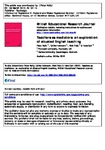Teachers as mediators: an exploration of situated English teaching
| dc.contributor.author | Kelly, Peter | |
| dc.contributor.author | Hohmann, Ulrike | |
| dc.contributor.author | Pratt, Nicholas | |
| dc.contributor.author | Dorf, H | |
| dc.date.accessioned | 2013-06-19T15:27:27Z | |
| dc.date.available | 2013-06-19T15:27:27Z | |
| dc.date.issued | 2012-03-09 | |
| dc.identifier.issn | 1469-3518 | |
| dc.identifier.issn | 1469-3518 | |
| dc.identifier.uri | http://hdl.handle.net/10026.1/1544 | |
| dc.description | Teachers as mediators: an exploration of situated English teaching | |
| dc.description.abstract |
Within the context of lower secondary English teaching in South West England, this study identifies in broad terms the competing goals between which English teachers mediate and the explicit and hidden tensions that result. To understand the interactions of competing goals, teachers’ goal-oriented behaviours are referenced to a set of idealised ‘role types’ based on the dimensions of goals, norms, discourses and practices. It is asserted that competing goals, significant to particular educational circumstances, emanate from various sometimes contradictory local, national and perhaps broader social and cultural influences on practice. Yet the teachers observed moved smoothly between goal-oriented behaviours in a continuous and comfortable style, easily and without reflecting any tensions between them. Thus, this article elaborates an account of situated English teaching. | |
| dc.format.extent | 609- | |
| dc.language | en | |
| dc.language.iso | en | |
| dc.publisher | Routledge | |
| dc.subject | English teaching | |
| dc.subject | situated teaching | |
| dc.subject | teacher mediations | |
| dc.title | Teachers as mediators: an exploration of situated English teaching | |
| dc.type | journal-article | |
| dc.type | Article | |
| plymouth.author-url | https://www.webofscience.com/api/gateway?GWVersion=2&SrcApp=PARTNER_APP&SrcAuth=LinksAMR&KeyUT=WOS:000321838700001&DestLinkType=FullRecord&DestApp=ALL_WOS&UsrCustomerID=11bb513d99f797142bcfeffcc58ea008 | |
| plymouth.issue | 4 | |
| plymouth.volume | 39 | |
| plymouth.publication-status | Published | |
| plymouth.journal | British Education Research Journal | |
| dc.identifier.doi | 10.1080/01411926.2012.665433 | |
| plymouth.organisational-group | /Plymouth | |
| plymouth.organisational-group | /Plymouth/Faculty of Arts, Humanities and Business | |
| plymouth.organisational-group | /Plymouth/Faculty of Arts, Humanities and Business/Plymouth Institute of Education | |
| plymouth.organisational-group | /Plymouth/REF 2021 Researchers by UoA | |
| plymouth.organisational-group | /Plymouth/REF 2021 Researchers by UoA/UoA23 Education | |
| plymouth.organisational-group | /Plymouth/Research Groups | |
| plymouth.organisational-group | /Plymouth/Research Groups/Institute of Health and Community | |
| plymouth.organisational-group | /Plymouth/Users by role | |
| plymouth.organisational-group | /Plymouth/Users by role/Academics | |
| dc.identifier.eissn | 1469-3518 | |
| dc.rights.embargoperiod | Not known | |
| rioxxterms.versionofrecord | 10.1080/01411926.2012.665433 | |
| rioxxterms.licenseref.uri | http://www.rioxx.net/licenses/all-rights-reserved | |
| rioxxterms.type | Journal Article/Review |


